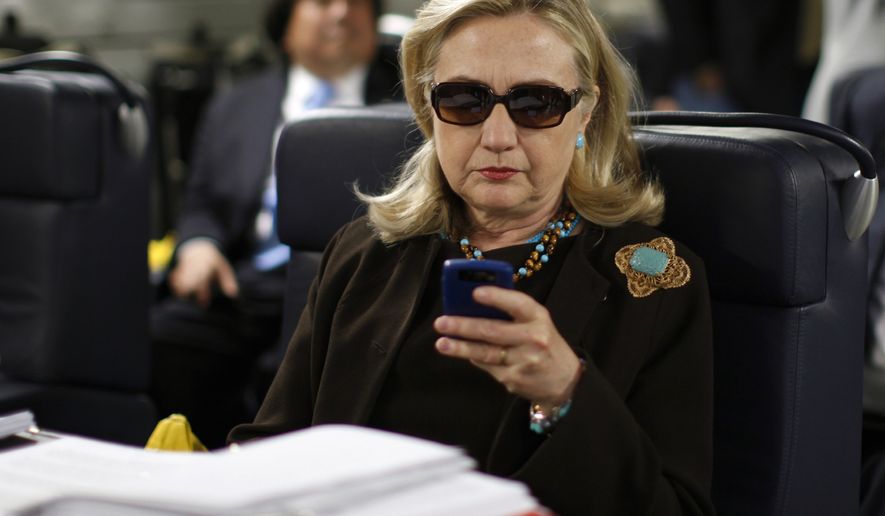It’s difficult to choose the most disturbing aspect of the State Department Inspector General’s report this week on Hillary Clinton’s email practices, but near the top of the list must surely be this: Virtually everything Clinton has said about her email has been a lie, and she knew it all the time.
Her first explanation was that she set up the secret server in her private home as “a matter of convenience” so she didn’t have to carry two devices.
Then she told us she was “not willing to say it was an error in judgment because…nothing that I did was wrong. It was not – it was not in any way prohibited.”
The whole thing, she promised, was “fully above board.”
“The truth is” she told CNN, “everything I did was permitted and I went above and beyond what anybody could have expected in making sure if the State Department didn’t capture something, I made a real effort to get it to them.”
And there was no indication, she assured us, that the server was ever hacked. “Not at all.”
Now, with the State Department IG report, we know it was all untrue. And Hillary knew it when she went on TV and said those things — lying to us again and again.
Contrary to Clinton’s claims that she set up her complicated server scheme to avoid carrying two phones, the Inspector General’s report proves that it really had nothing to do with “convenience,” and everything to do with avoiding public disclosure of her emails. The report shows that when Huma Abedin, the Secretary’s deputy chief of staff, suggested “putting you [Hillary] on state email…”, Hillary responded, “Let’s get a separate address or [second] device but I don’t want any risk of the personal being accessible.” In other words, her priority wasn’t to limit the number of phone she carried, but to avoid Freedom of Information Act requests.
That arrangement certainly was not “fully above board” nor was it “permitted,” according to the IG report. The IG states flatly, “She did not comply with the [State] Department’s policies that were implemented in accordance with the Federal Records Act.” Instead, her practices were “not an appropriate method of preserving any such emails that would constitute a Federal record.” So much for her claim that “nothing that [she] did was wrong.”
Clinton was equally dishonest when she said she “went above and beyond” and “[made] sure if the State Department didn’t capture something, [she] made a real effort to get it to them.” As the IG report points out, “Secretary Clinton’s production was incomplete.” For instance, she has produced no emails at all from her first several months in office — “from January 21, 2009, to March 17, 2009 for received messages; and from January 21, 2009 to April 12, 2009 for sent messages” — even though we know she was using email during that period. This months-long gap is in addition to the roughly 30,000 supposedly “personal” emails that Clinton deleted before handing the rest over to the State Department nearly two years after she left office.
Finally, the report revealed that despite Hillary’s insistence that her server was not hacked, she was in fact aware of repeated attacks on it. The server administrator, who worked for Clinton personally, advised Clinton aide Huma Abedin that “he had to shut down the server because he believed ’someone was trying to hack us and while they did not get in I didnt want to let them have the chance to.’ Later that day, the advisor again wrote to [Abedin], ’We were attacked again so I shut [the server] down for a few min.’”
The next day, according to the IG report, Abedin “emailed the Chief of Staff and the Deputy Chief of Staff for Planning and instructed them not to email the Secretary ’anything sensitive’ and stated that she could ’explain more in person.’” This suggests Clinton and her aides were at the very least seriously concerned that the server could have been hacked — far from having “no indication” that it might have been.
The fact that virtually everything Clinton has said about her secretive email system has proved to be a lie is probably no big surprise to the American people. In a recent Quinnipiac poll, the word most mentioned by respondents in association with Hillary Clinton was “liar.” The runners up were “dishonest” and “untrustworthy” — offered by a combined 394 people. The next most common term, “experience,” was offered by 82.
But while the lies revealed in the Inspector General’s report may not be surprising, they do deal with sensitive issues of national security — and that should be disqualifying for the job of commander-in-chief.
A normal person would be chastened by such a report. Having everything he or she said revealed as a lie might elicit some apology, for “an error in judgement” at the very least. But then again, a normal person would never have had such reckless disdain for the law to begin with, nor continued the dishonesty when caught. So now we watch uncomfortably, as Hillary goes on lying about lying — as if we didn’t already know.




Please read our comment policy before commenting.